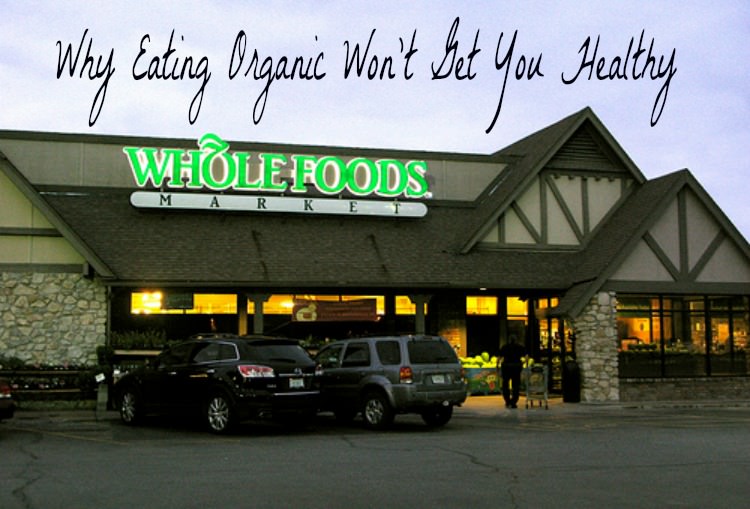
High five!
You’ve made some big changes in your family’s diet recently and are really focusing on eating organic. You’ve stopped buying boxed cereal and other processed snacks at the grocery store and are making homemade snacks and treats with wholesome ingredients instead. You’re even sprouting or soaking nuts and seeds and even your legumes and grains!
You’ve joined an organic fruit and veggie co-op and made the switch to grassfed locally produced meats. You’ve even taken the wise step of incorporating raw grassfed milk into your family’s diet.
While all these changes are wonderful and beneficial compared with how you’ve been eating, I’ve got some tough news for you.
These changes alone are not going to get you healthy.
Eating organic is not the way to health shocking as it may sound!
Gulp.
How can this be, you ask? Your diet is now light years ahead of where it was. How can this organic, whole foods diet not result in vibrant health?
Let me tell you a little story ….
The Telling Tale of the South Sea Islanders
The first Europeans to visit the South Sea Islands in the 1700’s were Captain Cook and his crew. Tahiti was truly a paradise with beautiful people whose frequent smiles revealed perfectly straight, pearly white teeth.
Dr. Weston A. Price found the same blissful environment nearly 200 years later when he arrived with his wife to study these happy, healthy people. Dr. Price noted that the bone structure of the South Sea Islanders was the most perfect of any of the 14 isolated traditional cultures he studied during his travels around the world in the 1920’s and 1930’s which he documented in the amazing book Nutrition and Physical Degeneration.
The traditional diet of the South Sea Islanders was high fat, consisting of seafood and pork with coconut the most important plant based staple. Tropical fruits and other plants were also consumed as there were plenty available in such a temperate and ideal growing climate.
The environment and water were, of course, pristine and food was abundant.
Wouldn’t such an organic, whole foods diet be enough for health?
No, it was not.
The South Sea Islanders knew from observation and perhaps instinct that their clean, whole mixed diet was not enough to maintain their own health or to produce healthy babies and children.
The Sacred Food the South Sea Islanders Could Not Do Without

Despite having plenty of whole, nutrient dense foods available during all times of the year, the South Sea Islanders risked their lives over and over again to hunt sharks.
Once a shark was caught and brought to shore, the liver was removed and put inside the shark’s stomach which was then hung on a tree to ferment.
The oil that came out of the shark liver as it fermented provided a plethora of fat soluble vitamins A, D, and K2 to the South Sea Islander diet that was the critical missing link for vibrant health. This oil was given to growing children and young adults who were about to get married and also to pregnant women. Such oil would have been critical to maintaining health into advanced age as well.
Dr. Price knew from research that the level of fat soluble activators in the South Sea Islander diet was about 10 times higher than the Americans of his day … and processed, devitalized foods had not even arrived in full force yet!
Fat Soluble Vitamins More Important Than Eating Organic
The story of the South Sea Islanders illustrates the critical nature of the fat soluble vitamins in the diet. Without them, no matter how pure, whole and organic a diet may be, health will not be maintained nor healthy children easily produced.
The fat soluble activators A, D, and K2 supercharge mineral absorption into the body tissues and enhance the health and function of every organ system.
Fortunately, fermented cod liver oil and fermented skate liver oil are available today that are very similar to the fermented shark liver oil consumed by the South Sea Islanders.
Please note that the typical brand name fish or krill oil and even cod liver oils on the market are highly processed, industrialized, rancid, deodorized oils that should be avoided. Only fermented cod and skate liver oil is processed with no heat as practiced by traditional cultures.
I have been taking these types of oils for many years and would never consider my whole foods diet complete without them. Why reinvent the wheel and experiment with the latest and greatest silver bullet supplements that seem to change every few months when traditional cultures such as the South Sea Islanders already knew what it took to have healthy babies and stay vibrantly healthy well into old age?
Where to Source Fermented Fish Liver Oils
Please refer to my Resources page for a list of companies that offer clean, purified fermented fish liver oils to provide your whole foods diet with the critical fat soluble activators A, D, and K2.
What to Do if You are Allergic to Fish
If fermented cod or skate liver oil aren’t possible for you due to a seafood allergy, note that you can obtain fat soluble vitamins in other foods valued by other Traditional cultures such as raw, grassfed butter (must be deep yellow to orange in color – sources), fish eggs (many can tolerate fish eggs even with a seafood allergy), emu oil from emus eating their native diet (sources), deep orange yolks from pastured hens, and liver from land based animals.
Sarah, The Healthy Home Economist
Source: Nutrition and Physical Degeneration, Dr. Weston A. Price DDS







I’m sorry, your argument doesn’t wash. There has been a lot of airtime recently with Dr. Oz’s ridiculous “about face” on organics, citing that “it’s too expensive” and “it’s not really that good for you anyways,” (among other arguments) that if one were not paying very close attention, this article might appear to be an attempt to throw in with that stinking pile of Big Agri/Pharma disinformation. It’s not, I can see that, but your article isn’t helping. For the simple reason that, while the fact that a food is organic might not necessarily mean it is nutrition dense, the two are not mutually exclusive, as your article seems to infer. In fact, they are mutually reinforcing, synergistic and complementary of necessity. I ask you: what is the use of getting fermented cod liver oil from fish raised in an overpopulated fish farm using heavy doses of antibiotics, or fermented butter from dairy cows being fed GMO soy? We’re talking about apples and oranges here: one is a method of production (organics), and the other is the content of that [food] production (nutritive density). Often, one finds that organic foods are more nutrition-dense, by the simple fact that organic standards necessitate holistic soil composition and animal care, which yield “crops” with a higher nutritive content that their conventional counterparts. So please, stop muddying the waters: both are necessary.
Thnx Erika I will chek that out
My husband was in a car accident and hit his head. He now has severe tinnitus and hyperacusis, and all the sleep problems associated with theses issues. I purchased a bottle of cod liver oil and skate liver oil from Green Pastures and had him start taking them. He was reluctant. After a couple of weeks he appeared to be coping better. We ran out and I wanted to see how he would do without, so I did not get more. He went down hill again and asked me to buy more, which kind of shocked me. We are taking it again and he is coping better. They have not fixed the underlying problem, but they help him to cope with the issues better.
Which is why the olive oil potato chips I just had (rare treat and “clean” enough) are, well, a rare treat…. 🙂 And the kombucha I just had is a daily occurrence!
I don’t agree, I have four young grand children, who have suffered a great deal with many allergies….my family has worked tirelessly to over come these…..completely ORGANIC, wheat free, spelt free, dairy free, sugar free….each person is an individual, and each of us have specific needs…needs….I disagree in every way that NOT eating organic will make you healthy….there are many, many pesticides in foods, they play a strong role in how healthy people are. I believe many of our diseases are directly linked to what foods are consumed, what we place on our bodies, shampoos, conditioners, underarm deodorant, detergents, tooth paste, teeth whiteners, the products we use to clean our homes, on and on…
I agree, I choose organic or from a farmer I know to avoid GMO’s
Tricia Mills Baehr GMOs are frankenfood and certainly not a nutrient dense choice.
What about GMO’s?
Thank you! Nutrient dense is something I barely hear anyone speak of.
To save money, I buy almost all of my vegetables and some fruits frozen. That way I can get them organic but for less. I also don’t have to worry about it going bad because I forgot I had it, which happens to me a lot :/ Most of my food budget goes to organic meats/poultry, butter, and raw milk. I just bought a couple of sourdough cultures and I want to get a kefir culture next. I swear kefir is incredible. I had the worst stomach bug of my life, worst than labor pains, just the other week, and a kefir smoothie knocked that sucker out! I definitely have learned what’s most important to buy. I’m also on food stamps 🙂